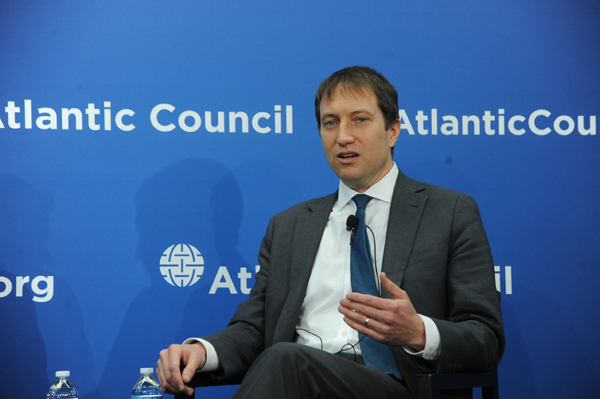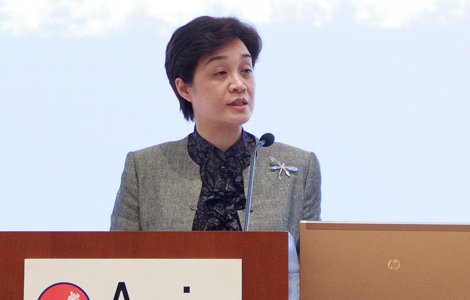US, China expected to lead on climate talks
Updated: 2015-01-28 06:44
By AMY HE in New York(China Daily USA)
|
||||||||
 |
|
Rick Duke, deputy director for climate policy at the White House, speaks on Tuesday at the Atlantic Council in a seminar on assessing US and Chinese national plans and their potential impacts on a Paris climate agreement. Provided by Zhang Weiran / for China Daily |
As the 2015 Paris climate talks approach, an agreement between the United States and China will encourage other countries to consider their own contributions, US energy experts said on Tuesday.
"The joint announcement with China made by the president on post-2020 reduction targets from both countries is an important step in building momentum," said Richard Duke, deputy director for climate policy at the White House Office of Energy and Climate Change. "That is really quite palpable in international dialogues for other countries to step up, to make serious post-2020 commitments and deliver against that."
Andrew Steer, president and CEO of World Resources Institute, a Washington-based climate think tank, said that energy experts are generally more optimistic about efforts on climate change than they were two years ago.
The US-China climate announcement in November was an "extremely important move", Steer said, because the two countries combined account for almost 40 percent of global carbon emissions.
In a landmark agreement in Beijing during the Asia-Pacific Economic Cooperation summit, Chinese President Xi Jinping and US President Barack Obama announced new carbon-reduction targets, with China committing for the first time to peak its emissions by 2030.
Obama said the US aims to cut greenhouse gas emissions 26-28 percent below 2005 levels by 2025, and Xi said China wants to peak emissions by 2030, if not sooner, and increase the non-fossil fuel share of all energy to around 20 percent by the same time.
"Not only because if combined the US and China account for almost 40 percent of emissions and therefore, in and of itself, that [announcement] matters, but because of their influence on others," said Steer. "If you add the European Union in, which has already announced its offer of a 40 percent reduction from 1990 to 2030, you've now got half of all the world's emissions, US, China, and Europe, being announced already."
Steer and Duke spoke Tuesday on a panel discussion hosted by the Atlantic Council to assess what countries need to do before the Paris talks. At the United Nations Climate Change Conference, countries around the world will reach a universal agreement on climate change.
"The good news is that in all of the analysis nowadays, the best economists in the world … are suggesting that the old-fashioned idea that it's going to cost you an awful lot to reduce your carbon emissions actually isn't true," Steer said. "That's exactly what China has figured out. China's commitment is to peak by 2030, and you can say that that's not very impressive, but actually it's quite impressive."
Steer said that China's current efforts are partly because it wants to be part of the solution for global climate change, but also because the "arithmetic and the economics suggests that it is in their interest to peak by 2030, even if climate change didn't exist".
China's efforts to reduce domestic pollution, increase the efficiency of its use of resources, promote new technologies and devise new strategies of urbanization all are part of its approach, he said.
"It turns out that doing those [things that] will get you to peak by 2030 [is] in your own interest," Steer said. "China is now on a path which is very encouraging; it's now as you know experimenting with over 100 million people, a cap and trade on carbon emissions, which will go national, we expect, in 2016 or 2017. Pretty serious efforts out there, and already, as you know, they are investing more in solar and in wind than any other country in the planet."
amyhe@chinadailyusa.com

 'Polar bear' roams in London, but don't panic
'Polar bear' roams in London, but don't panic
 Old photos of China's military parade
Old photos of China's military parade
 US, China expected to lead on climate talks
US, China expected to lead on climate talks
 Weighing in on justice in China
Weighing in on justice in China
 Northeastern US braces for 'crippling' blizzard
Northeastern US braces for 'crippling' blizzard
 At least 2 dead, dozens hurt after bus hits road barrier
At least 2 dead, dozens hurt after bus hits road barrier
 Red carpet of 21st annual SAG Awards in Los Angeles
Red carpet of 21st annual SAG Awards in Los Angeles
 New Year celebrated with dance mix
New Year celebrated with dance mix
Most Viewed
Editor's Picks

|

|

|

|

|

|
Today's Top News
US, China expected to lead on climate talks
Weighing in on justice in China
China wants US to help build trust on maritime disputes
Yahoo to spin off Alibaba shares
China to open markets to all apples from US
Parade will commemorate victory over Fascism
Expatriates to be lured for startups
Beijing gears up for Super Bowl
US Weekly

|

|








